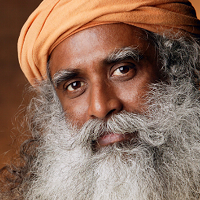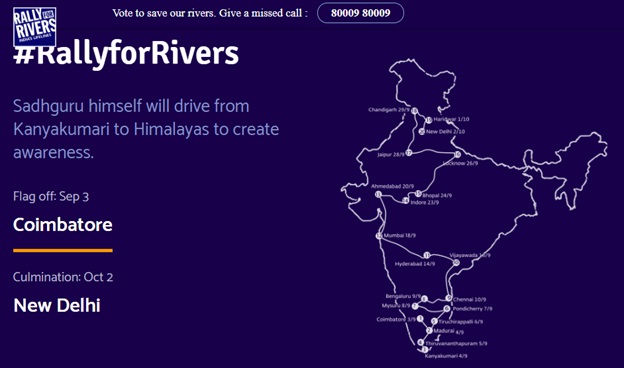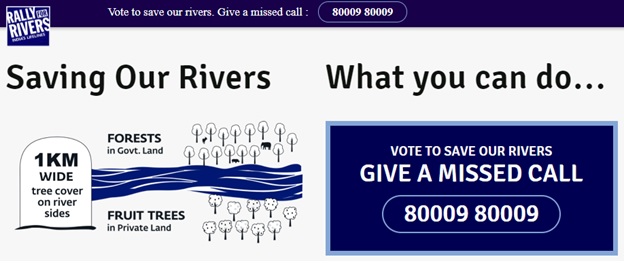Contribute
| Like Our Rivers, Have We Lost Our Way? |
Press Release
08/25/2017
Like Our Rivers, Have We Lost Our Way? We have caused our rivers to go dry and lose their way. Are we losing our own way too? Will we find our ultimate source, Sadhguru asks, or will we get lost along the way? Sadhguru: The word “Veerashaiva†literally means a very brave or valiant Shiva bhakta. In the philosophy of the Veerashaivas, they always use the analogy of rivers and oceans. Shiva is referred to as the ocean, and individual people as rivers. What they are trying to say is that inevitably, every river naturally runs to the ocean. The only question is how much it will meander. But we as a generation of people are trying to prove that rivers don’t need to go to the ocean. They can dry up on the way. We are that kind of a generation. The drying of our rivers is a consequence of the way human beings are living. This is happening only because a large percentage of humanity has forgotten the nature of their existence. There used to be only one river in the entire country which did not reach the ocean, the Lavanavati in Rajasthan. It dries up in the desert. But today we have produced many rivers which don’t go to the ocean at least part of the time, and many which don’t reach the ocean the entire twelve months in the year. The Ganga and Indus are now among the most endangered rivers on the planet. Kaveri is maybe forty percent of what it used to be fifty years ago. For the last Kumbha Mela in Ujjain, they had to pump water from the Narmada to create an artificial river, because there was no water in the Kshipra. The small ones don’t even reach the main rivers. They dry up somewhere along the way. Rivers like Amaravati are supposed to be “eternalâ€. When it is all rock, of course it can be eternal! This is not just about our rivers. It is about the way we are. Will we naturally find our ultimate source, or will we get lost on the way? How long have we decided to be lost? The further we move away from nature, in many ways, the further we move away from our own nature. The other way is also true – the further we move away from our own nature, the more insensitive we become to every other life around us. Water is not a commodity. It is life-making material. The human body is 72% water. You are a water body. And on this planet, rivers are the water bodies with which we have the closest relationship. For thousands of years, these rivers have embraced and nourished us. A time has come when we have to embrace and nourish our rivers. We have to make everyone in the country aware that there is an express need for action to save our rivers. We urgently need to shift from thinking of how to exploit our rivers to how to revitalize them. The simplest solution for this is to ensure tree cover for a minimum of one kilometer on either side of the river, and half kilometer for tributaries. People think because of water there are trees; no, because of trees there is water. If there are no trees, there will be no river after some time. Wherever it is government land, we plant forest trees. Wherever it is private land, we shift from soil-depleting crops to tree-based horticulture. This will also result in a significant economic benefit for the farmer, and their incomes will more than double in five years. If we can implement this as an enforceable policy, in ten to fifteen years’ time, we will see our rivers flowing with at least fifteen to twenty percent more water. If you look at the people we worship in this culture, whether Shiva, Rama or Krishna, they were people who walked this geography at one time. They went through many more trials and tribulations than most human beings do, but the reason we worship them is because, no matter what situations happened around them, no matter what challenges life threw at them, they did not deviate from their inner nature. We worship them because they remained untouched. In many ways, a river represents that: it doesn’t matter what kind of people touch it, it remains pure because its nature is to flow. In this culture, we did not see rivers as just water bodies. We see them as life-giving gods or goddesses. To a thinking mind, which is confined to the limitations of its logic, this may sound foolish or very rudimentary. “A river is a river. How is it a goddess?†If you lock up such a person in a room without giving him water for three days, and then show him a glass of water, he will bow down to it – not to a river, just a glass of water! What we call water, air, food and the earth that we walk upon, are not commodities. We never saw rivers as just geographical happenings. We always saw them as life-making material because over 70% of our body itself is water. Whenever we look for life, we look for a drop of water first! Today, in the world, we are building medical infrastructure in such a way that we seem to expect that everyone will be seriously ill someday. There was a time when there used to be one doctor for the whole town and it was enough. Today, every street has five doctors and it’s not enough. This shows how we are living. When we forget how to live, when we do not respect what makes our life – the earth that we walk upon, the air we breathe, the water we drink and the very space that holds us in place – when we have no respect and reverence for that, how they behave within us will be very different. You are a water body. And on this planet, rivers are the water bodies with which we have the closest relationship. But our rivers have depleted dramatically in a matter of a few decades. In two generations, our perennial rivers – which have been flowing for millions of years – are turning seasonal. We are turning this land into a desert. For thousands of years, these rivers have embraced and nourished us. A time has come when we have to embrace and nourish our rivers. People think because of water there are trees; no, because of trees there is water. If there is no forest, there will be no river after some time. But a large part of India now is farmed land, which we cannot convert to forest. The solution is that, for a minimum of one kilometer on either side of the river and half kilometer for tributaries, wherever it is government land, we plant forest trees. Wherever it is private land, the government needs to subsidize farmer to move to tree-based horticulture. This will also be of economic benefit to the farmer because his income will more than double in five years. We urgently need to shift from thinking of how to exploit our rivers to how to revitalize them. We have to make everyone in the country aware that there is an express need for action to save the rivers. If we spread this awareness to everyone in the country, arrive at a common policy, and start the implementation, it will be a huge and successful step for the future of our nation and for the wellbeing of generations to come. Why Rivers Are Worshiped in Indian Culture (YouTube) Sadhguru looks at why rivers are worshiped in Indian culture. He explains how rivers were never seen as just water bodies or geographical happenings, but as life-making fundamentals. Sadhguru revs up to #RallyForRivers! Starting on September 3rd Pledge Your Support with a Missed Call to 011-91-80009 80009 Boston & Chelmsford – Starting on September 28th 2017 @Saints Vartanantz Armenian Church, 180 Old Westford Rd, Chelmsford, MA 01824 @The Inn at Longwood Medical, 342 Longwood Ave, Boston, MA 02115 Inner Engineering provides tools and solutions to empower yourself to create your life the way you want it. It gives you the opportunity to intellectually explore the basics of life using methods from the distilled essence of yogic sciences. The course imparts practical wisdom to manage your body, mind, emotions, and the fundamental life energy within. Email: NewEngland@Ishausa.org | Phone: (617) 396-4742 | Registration Link YouTube Music Gauranga by Sounds of Isha 
Upcoming Isha Programs
Isha Inner Engineering Total Program
You may also access this article through our web-site http://www.lokvani.com/





